(This post is from 2016: Northern Mockingbirds have become steadily more abundant in southern Ontario.)
While I enjoy watching winter ducks and the small birds that only flock south to visit us when there’s snow on the ground, I’m always interested in birds that aren’t common in my immediate area. So this February, I went in search of Northern Mockingbirds and found not one but two despite the snow here in southern Ontario.
The Silence of the Mockingbirds
According to the Cornell University website Northern Mockingbirds “sing almost endlessly.” I guess that’s birds that aren’t freezing their tail feathers off as neither of the two I spent time with recently emitted even the faintest “cheep.”
What Do Mockingbirds Eat Especially In Winter?
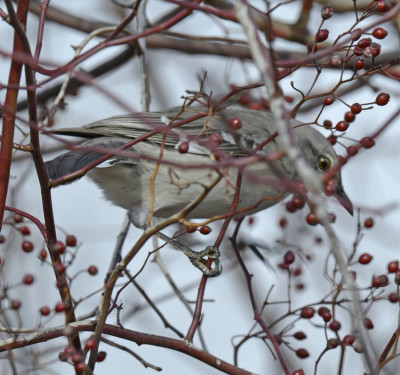
Mockingbirds are noted for their long tails but if you see one in a pose like this you might not agree.
Like many birds, Mockingbirds eat insects in summer and fruit in winter. So when I was looking for them this winter, I paid more attention in places with rose bushes and small decorative crabapples than in open wind-swept fields of dry grasses and in the spruce and maple forests.
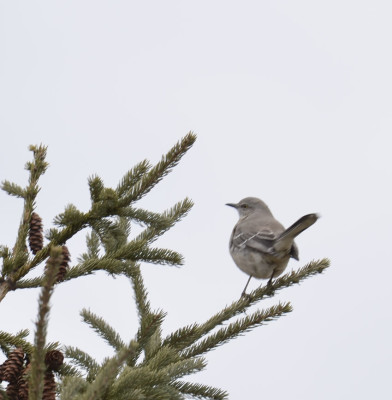
OK, this one was perched on a spruce but only briefly.
Both of the birds I found were near Multiflora Rose bushes still covered in small red fruit. My two Mockingbirds were not unique for eating the hips off the rose bushes: the AllAboutBirds website says they eat many fruits in the colder months “as well as fruits from multiflora rose.”
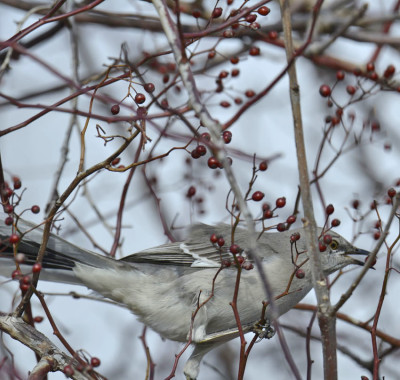
It’s hard to see but this Mockingbird is actually plucking a rose hip off the bush.
In the summer, I would expect to see them just about anywhere as they eat worms, caterpillars, bees, moths, beetles and just about anything else small that moves!
Are Mockingbirds Common in Ontario?
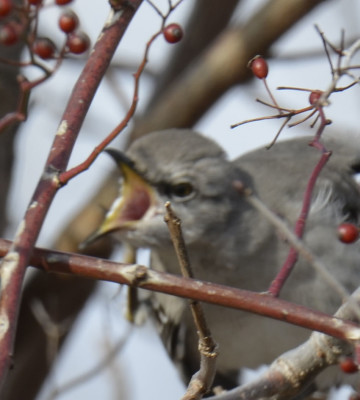
The shape of the bill is a bit unusual as you can see in this out-of-focus shot.
Like many southern birds that are expanding north, Northern Mockingbirds are “locally” common. Like the Northern Cardinals who moved into southern Ontario a few decades ahead of them, the Mockingbirds first move into an area as an unexpected surprise but if they experience breeding success become a regular year-round resident of their new neighbourhood.
In general, Mockingbirds don’t migrate south for the winter. So like Cardinals, Tufted Titmice, Carolina Wrens and other southern birds that now make Ontario their home, Northern Mockingbirds are limited in how far north they can establish themselves.
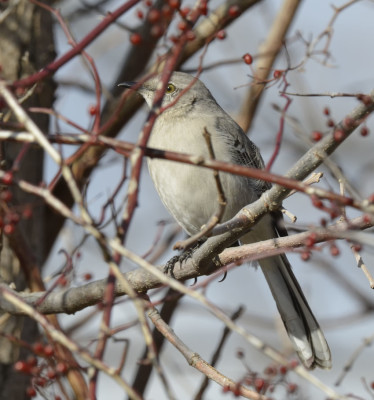
The eye is quite noticeably bright and looks red, yellow, orange or even greenish depending on the lighting.
In a mild winter, like this one (so far) in 2015-2016, mortality will usually be low. In a winter with weeks of -20C weather punctuated with fruit-hiding ice storms, the mortality rate will be much higher. Unlike Black-capped Chickadees, Dark-eyed Juncos and Gray Jays which have developed strategies to deal with cold weather, Mockingbirds don’t have techniques to cope. If there are enough “warm” winters in a row, their range grows and more people get to enjoy these new neighbours.
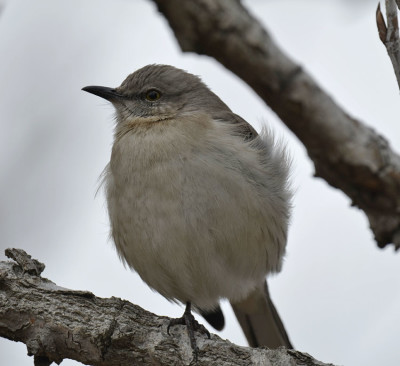
From the front, Mockingbirds are very plainly coloured.
While I’ve seen Mockingbirds several times in the Toronto to Hamilton area, I still enjoy each sighting. I’m sure some Birders in the US would find it quite amusing that I had to “stalk” these birds to get photos: to them, it would be like having to “stalk” a backyard Robin. That’s one of the amusing quirks of bird watching.
Related Reading
- What Black and White Bird has a Tan Helmet and Likes Grassy Fields?
- What Small Chunky Brown Birds Hold Their Tips Up Straight?
- What’s Mewing Like a Cat?
Join In
Have Northern Mockingbirds made it to your neighbourhood yet? Does the steady singing of the males disturb your sleep? Please share your experiences with a comment.

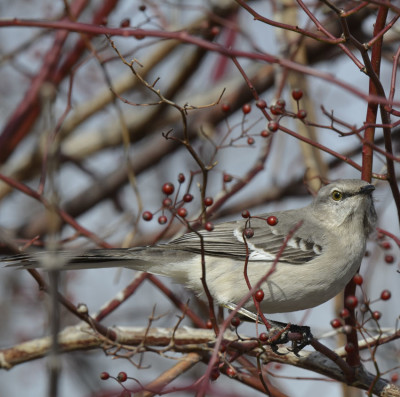
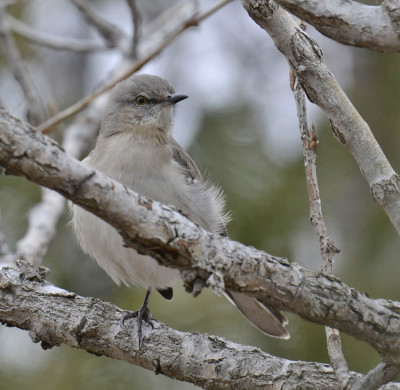
i found one today in London ontario
Great New Year’s find!
I’ve been watching some baby mockingbirds being feed by step-mommy wren today…she leaves them a bit and they either sit on my lawn or up by the food dishes. They graze by themselves when she is gone, and do the baby bird wiggle when she appears with something to eat. It doesn’t last long, with their big appetites.
my husband and I saw a northern mockingbird in our backyard this morning. we have quite a few bushes that contain red berries as well as a few rose bushes, so I guess that’s what attracted it. we were quite excited to see it. We live in Welland.
Wonderful! There is a good chance it will visit again if their is fruit that it likes. Thanks for sharing your sighting!
Just saw one today in a stand of sumac trees in Meadowvale (North Mississauga) along with a flock of about 30 Robins
What a great sighting! Thanks for sharing it!
There is one the past week or so in Riverside Park here in Guelph.
Got out and saw it yesterday.
Thanks for sharing your sighting!
I believe I have one cheerily going through a seemingly endless repertoire here near Penetanguishene . Trying to get a decent photo but it’s staying up high in the maples.
That’s a bit out of their usual range but anything is possible especially since they are trying to expand northwards. Some others to consider are Brown Thrashers which are great mimics and known to be in your area right now, Catbirds and European Starlings. Catbirds are also good singers and have dull grey colouring. I hope the singing isn’t waking you up too early and thanks for sharing your sighting!
Me and my wife saw one in Oxford Mills Ontario, the Ottawa area, was quite nice to see
Thanks for sharing!
We had one at our suit feeder for two days in mid May. A first “home” Mocking Bird for us.
Way cool! Thanks for sharing!
I’m pretty sure I saw and heard one at the Second March in Oshawa Ontario on June 12. I just spent 4 months in Florida where they are plentiful. It’s possible it could have been a Catbird but had the head of a Mockungbird
There have been some reported to eBird from Oshawa, so I think you’re right!
Hello from Toronto! I had a northern mockingbird show up in my back yard (I’m just west of the Don Valley) last Jan/Feb of 2019 but he didn’t stick around more than 3-4 weeks I don’t think. Well, he just showed up again in the last week. I always hear him before I see him! I assume he’s a male. He’s quite big and looks the same as when I last saw him.
Interesting! I wonder if he moves slightly for the nesting season and then comes back for the winter. Maybe there are more food sources (berries and crabapples etc.) near you to help during the winter.
I saw 6 Mockingbirds in the hydro corridor between keele st. and Dufferin north of Finch Ave, in Toronto on Say Dec. 7th. There is also 1 at York University at keele and Steeles in T.O.
That’s quite a good number to see in one day! Another Birder told me that they seem to spread by following railway lines. I wonder if they also follow hydro corridors?
On May 2nd, 2020, we heard a bird singing at around 1:30 AM from a tall juniper, in front of our house. Based on the specifics of its song we identified our unusual visitor as a northern mockingbird and were able to confirm it in the next few days based on its looks as well. It kept singing regularly 1 to 3 hours for the next 23 nights, loud and clear, sometime starting its nocturnal recital sooner than other times, even during colder nights, at -5C degrees. We were able to hear and see him singing over the day as well, from the rooftop of the house or the trees and the lamp pole nearby. He was even hopping in our front yard along with 1-2 robins at times, or just resting in the shrubs or the junipers. We live at the border of Woodbridge and Toronto, south of HW7 and West of Pine Valley Dr. relatively close to a hydro corridor and a train track. Aftera more than 3 weeks, on May 25, the mockingbird changed its location, moving his nocturnal recital about 500-800m in a shrub closer to the highway and the hydro corridor. We were wondering if he found a female partner or if that’s simply something they do. Its presence inspired us and we started to search for its habits and life. We have pictures and a few recordings with him…and already started to miss his song. The info about northern mockingbirds in Ontario from your site helped us more about this fascinating first-time visitor, still quite a rarity here. Thanks.
I’m glad you’ve got a chance to learn about one of these birds so personally–they aren’t living close to me yet so I’m envious. They will move to nest and if they have no luck at all in an area can leave entirely to try somewhere new. Otherwise it’s more the newly fledged ones that are expanding the range by moving away from their parents. So hopefully yours will stick around and maybe bring a family over to your yard. (It may like wintering in your Junipers for the shelter and the berries, so it may be back!)
I saw a Northern Mockingbird in our front yard in Vaughan. We were amazed at how loud he’d sing throughout the night. After about 1 month, he shifted his nest over to a shrub along the hydro corridor nearby.
Sorry for the delay in replying!
I have a mating pair in leamington. After doing some research , I discovered that is why my starling population may be down
They are interesting birds, for sure!
we live in Oakville by the lake and had two pairs build their nests in our hedge and really seem to enjoy our Suet feeders,however from mid August we no longer see them and assume they have gone south,really miss them
Many Mockingbirds over-winter, so you may see them again if they have just moved around after raising their chicks. Hope so! If not, they will likely be back in the spring. Either way, they are lovely birds, and I’m glad you got to see them so well.
I have once again discovered this site. A couple of comments I would like to make regarding other posts. In the GTA and Golden Horseshoe Mockers are not rare but uncommon to locally common. Maybe not as common as 8,10,12 years ago but still around. They very much like the hydro corridors and will travel along them and fan out to suitable habitat.Rail lines as well. Also Mockers that sing at night are usually unmated males. Recently due to covid l have been walking a lot [wearing a mask], often in areas where there are not a lot of people and these are the mockers I have come across . Dec. 14- 1 at Rudy,s garden in the Black creek parklands, Dec. 18-2 at the G.ross lord Dam north side of the dam pond in the Hydro corridor at Dufferin st. ,Dec.19 -2 seen from fields beside railway tracks between steeles ave. and Hwy 407 west of keele st. in Vaughan, Dec.20 -1 Finch hydro corridor 3 minutes walk east of keele st. and Dec.23- 5 In the Finch hydro corridor between Dufferin St. and the GO rail line which is west of Dufferin. The Finch hydro corridor has a paved bike lane running through it. Note that practically all of them are in the hydro corridor. Sorry for the long comments. Anyway enjoy the birds. Cheers Graham
Thanks for your detailed info!
Today, [Sat. May 29,2021] while walking near and on the bike trail that goes beside the hydro corridor between Dufferin and Keele Sts., north of Finch Ave. in Toronto I came across 12 Mockers, 9 adults and 3 nestlings. The nestlings were quite large and will soon leave the nest . Other birds in the area as well.
There are 2 pairs of Mockers,north of Steeles Ave.,west of Keele st. in Vaughan along the railroad tracks. They can be viewed from the fields beside the railway so need to go on the tracks which is never a good idea! Cheers
Seen one for the first time in sudbury ontario today. It was mimicking machinery and car alarms as well as bird noises, was able to record it for about 4 minutes before he flew off. Very cool
That’s a good sighting! There are a few reports on eBird.org of Mockingbirds in Sudbury but no recent ones.
For several weeks now, I have been entertained by what I believe is a Northern Mocking Bird. I take my dog to the leash free dog park in Hamilton Ontario about the same time daily (between 5 & 6 o’clock) and there is sits on a 10 meter high lamp post. At first, I couldn’t believe any bird could have such a singing vocabulary! While the dogs play, he sings! Only stops briefly to jump in the air, land on the post again and start singing. He copies every local bird from Seagulls to Crows to Kildare. Its quite amazing! Thank you for the pictures and letting me know what type of bird he is!
Sounds like your bird puts on a great show while the dogs play!